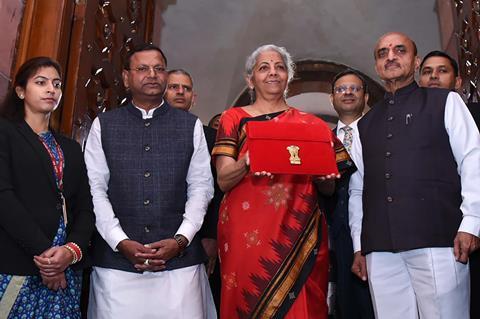
INDIA: The government will increase funding for the national railway network to its highest ever level in 2023-24 in order to support further capital investment, according to Finance Minister Nirmala Sitharaman.
Presenting the national budget for the financial year from April 1 to parliament on February 1, she explained that the Indian economy had been growing at 7% during the 2022-23 financial year, which she said was ‘the highest among all the major economies’. Spending on modernisation and expansion of the rail network is expected to encourage and support further economic development.
Emphasising that ‘investments in infrastructure and productive capacity have a large multiplier impact on growth and employment’, Sitharaman listed infrastructure, investment, last mile connectivity and green growth among the seven priorities for her budget. The budget envisages a capital outlay for the railway of Rs2·4tr, enabling IR to continue its focus on infrastructure enhancement. This is around 20% of the country’s total ‘effective capital expenditure’, which is budgeted at Rs13·7tr or 4·5% of GDP.
The finance minister said 100 critical transport infrastructure projects had been identified, covering last and first mile connectivity for ports, coal, steel, fertiliser and the food grains sectors. These ‘will be taken up on priority’, she explained, representing an investment of Rs750bn including Rs150bn to be raised from private sources.
Including funding from non-budgetary sources, IR’s total capital expenditure for 2023-24 has been budgeted at Rs2 602bn against a latest estimate of Rs2 453bn for 2022-23, and significantly greater than the Rs1 903bn spent in 2021-22.
Operating budget
In terms of the railway’s day-to-day operations, the budget statement anticipates that IR will achieve an operating ratio of 98·45 during FY 2024, a slightly worse performance when compared to the 96·98 budgeted for the current year, but close to the latest revised estimate of 98·22. IR’s total revenue during 2023-24 is expected to reach Rs2·65tr, up from a revised estimate of Rs2·43tr for FY 2023, while net revenue expenditure is also budgeted at around Rs2·65tr. This is partly a result of increasing staff costs, which are expected to rise by 5% from an estimated Rs1tr in 2022-23 to Rs1·052tr in 2023-24.
IR has seen a substantial improvement in both its freight and passenger revenues during the current financial year. Freight earnings in the first nine months from April to December 2022 totalled Rs1·18tr, up by 16% compared with the Rs1·01tr reported for the equivalent period in 2021. Passenger earnings jumped by no less than 71% to Rs466bn in the first nine months of 2022-23 from Rs273bn in the corresponding nine months of the previous year, when ridership was depressed as a result of the coronavirus pandemic.

















